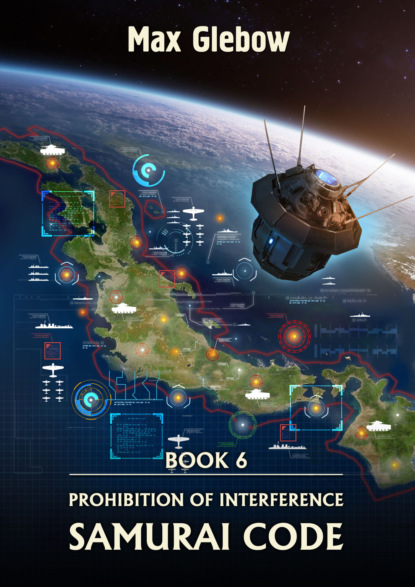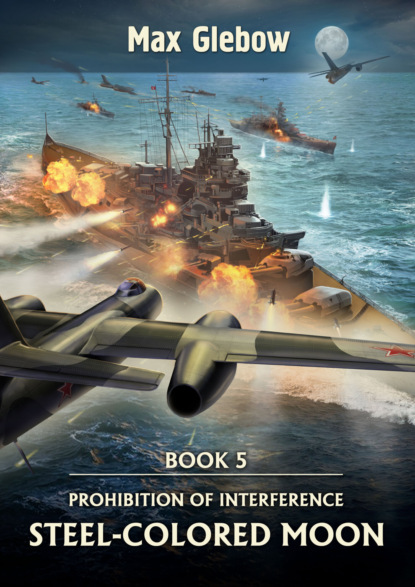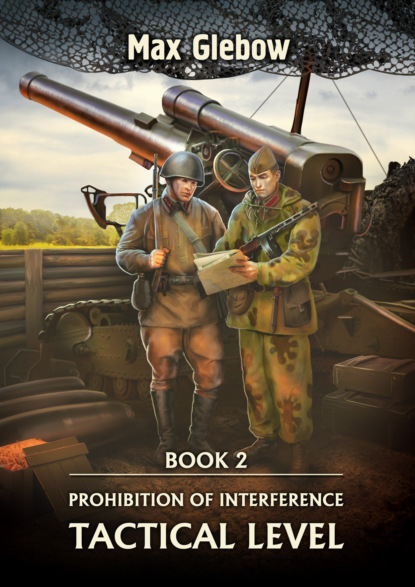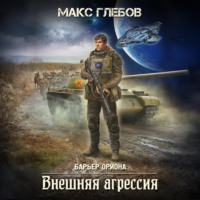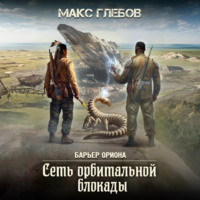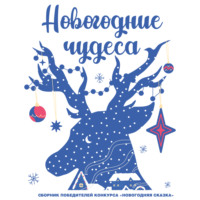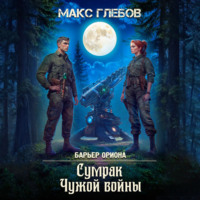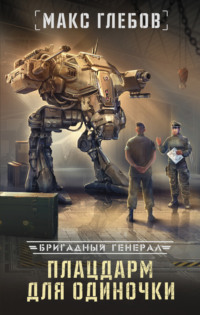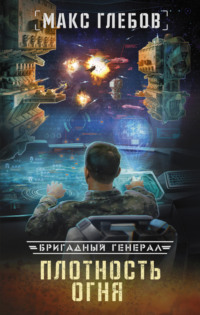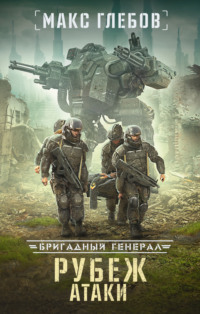
Полная версия
Prohibition of Interference. Book 1
The taiga on my way turned out to be really dense, but a couple of dozen kilometers from the drop point the satellites saw an abandoned Old Believers' farmstead, to which I was now approaching. Given that I needed a believable legend and at least some local clothes, it certainly made sense for me to check the place out.
I had no experience walking through the taiga, so my speed left a lot to be desired. I had to go, as they say, using general erudition, since pilot training did not devote much time to the problems of survival in the forests and jungles of the oxygen planets, to say the least.
I reached the lodge when it got noticeably darker. The place really turned out to be long abandoned. Those who once lived here apparently went into the taiga and never came back. There could be many reasons for this. There were plenty of dangerous predators around, and I had more than once praised myself for that I had decided at the last moment to bring my standard pistol.
The horizontal pole fence had long since lost its battle with the rain and wind, and in many places it was gaping holes. Things were no better with the outbuildings, which stood on the perimeter of the vast yard overgrown with grass and young trees. It didn't take long to examine them. If there had ever been anything of value in those animal barns and pens, it was now just shapeless piles of decay.
The house was somewhat better preserved. The thick logs held up for now, and the owners had renewed the roof, apparently just before they disappeared. The door was a little warped, but it still seemed pretty solid. It was bolted from the outside, but there was no lock, so I, after a bit of fiddling with the rusty bolt, I entered the long-abandoned dwelling.
Apparently, only one person lived here. It looked like this house was once inhabited by a large family, but then, evidently, something happened. Maybe illness, or maybe something else. But in the end there was only one owner left. The house had two living rooms, a hallway, and something like a kitchen, although I could not identify with complete certainty the purpose of this elongated room. The roof was leaking in many places and some of the furnishings were hopelessly ruined, but some things have survived.
After a thorough search of the crudely made furniture, I found myself in possession of a pair of pants that fit me relatively well, shapeless but warm enough, three shabby shirts, some very old but neatly stitched quilted jackets, several shifts of strange-looking underwear, and, most important, a bunch of yellowed papers that clearly served as identity documents and social status documents for the locals.
I carefully read and remembered the names of the people who once lived here, their dates of birth, and in some cases – of death. The overall picture was poor. Apparently, here, in the middle of nowhere, even births and deaths were not well documented, to say nothing of other, less significant facts of citizens' biographies. But I did manage to understand some things. The documents in a separate box apparently belonged to the last inhabitant of the house – Ivan Terentyevich Nagulin, born in 1890.
Judging by the names I could make out on several covers of books blackened by time and damp, he was, like the rest of his family, Old Believer, who had gone into the woods with his parents at the end of the 19th century, and who had been staying in the taiga permanently ever since. Ivan Terentyevich was old enough to be my father, and after some reflection, I decided that I could not find a better option for my legend.
* * *I was too late for the start of the war after all. An Old Believer who came out of the taiga, having decided to return to the world after his father's death, aroused natural distrust in the representatives of the Republic's authorities. The lack of other documents than my 'father's' passport, issued back in czarist Russia, also did not help my smooth entry into the local society. I was lucky enough to get some of the right words from the newspaper Tuvan Truth, published here in Russian, which was crudely pasted on the wall of the house of some official institution in Kyzyl. I surrendered to the local people's militia completely voluntarily, so I was beaten without any excess, just to prevent and to make sure I knew exactly where I ended up.
The district militia chief, to whose office I was taken after my arrest and initial processing, was rather skeptical about my words about the boring taiga and my desire to return to my ancestral homeland. It seemed that my case was not unique here, although it was quite rare. After the interrogation, which he conducted with a boredom in his eyes, he scribbled some words on a yellowish sheet of paper and summoned a sleepy guard, who took me to a cell with a dirt floor and uneven, badly painted walls. No one was going to feed me here, but they did give me some water.
Toward evening a representative of the local security service came to pick me up. This organization bore the complicated name of the Office of State Internal Political Security. Unlike the militiamen, the officer who arrived was Russian, and his uniform was of much higher quality. Guarded by a soldier armed with a rifle that was outdated even by local standards, I was taken to the central part of town in a very quaint and mercilessly stinking horse-drawn vehicle.
They didn't keep me in a cell and immediately sent me for interrogation. The specialists here were more thorough, in the sense that they beat me longer and more thoughtfully. Nevertheless, they weren't going to maim me, because they didn't seem to have anything to maim me for yet. Naturally, I offered no resistance, limiting myself to timely tensing and relaxing the necessary muscle groups, as well as making light movements of the body and limbs, which helped to minimize the damage to my body from the not too dexterous and skillful blows of the investigators.
At the first interrogation I heard no intelligible questions, except the idiotic accusations of espionage and work for subversive counterrevolutionary organizations. Naturally, I kept making round, innocent eyes, pretending complete incomprehension, and I kept bluntly telling time after time about my Old Believer father who died in the taiga, and the rest of the family, whom I barely remember, who were carried away by some contagious disease. However, the investigator didn't really insist on anything. Apparently, this was the custom here, and it was all standard psychological treatment before the normal interrogation, which took place only a week later.
I don't know how long this whole story would have lasted, and maybe I would have been sent to some mines or camps in the end, for free labor was not at all superfluous to the expanding economy of the People's Republic, but then the Führer of the German nation, Adolf Hitler, ran out of patience and ordered an attack on the USSR. Information about the outbreak of war roused the Tuvan People's Republic with unexpected force. Even I, a prisoner without rights, was made aware of this information, although they could have done without telling me about it, for I knew what was going on far better than any of the investigators here, and even better than Comrade Stalin himself, because from low orbit it was perfectly visible how endless columns of tanks and infantry were advancing toward the border, how technicians at airfields were bustling about, hanging bombs on planes, and how the whole armada, obeying the iron will of their Führer, came into motion and crossed the Soviet border to the roar of the artillery cannonade.
The Tuvan Communist government owed much to Comrade Stalin, so much so that on the same day, June 22, it declared war on Germany, and proclaimed through the Great Khural that 'The Tuvan people, led by the entire revolutionary party and government, not sparing their lives, are ready to participate with all their might and means in the struggle of the Soviet Union against the fascist aggressor until final victory over him'. How about that! And that's when I declared that I wanted to do it, too – without sparing my life and with all my might!
I don't know what I did to convince the local security service, but they didn't seem to see me as a subversive person or a real spy after all. And what can you take from a Russian who is eager to fight for Comrade Stalin in a friendly Soviet Union? Why waste energy and time on him when you can let this naive young guy go to the USSR and thereby serve the mighty neighbor by throwing him some cannon fodder. People like me – not in the sense of those who came out of the taiga without documents, but in the sense of the Russians who wanted to fight the fascist aggressors along with their Soviet brothers, there were an unexpectedly large number of them in Tuva.
In the end I was given a document that struck me as blatantly unclear and completely devoid of any means of protection against forgery. This paper stated that I was Pyotr Ivanovich Nagulin, born in 1921, Russian. And, in fact, that was it. No citizenship, no place of residence, no education, no occupation, not even a number – nothing. In general, it was possible to understand the local officials who gave me this document. I claimed that I didn't even know exactly on whose territory my father's cabin was located. I only knew roughly where to go, but I walked for many days and came out of the forest in Tuva. I said that I really wanted to go to the Soviet Union and asked the local officials to help me. Where are my papers? There weren't any, in the taiga, well, either my father lost them or hid them somewhere so that I couldn't find them.
No one was going to leave me in Tuva, and the fate of a Russian who had asked to go to war to the Soviet Union was of no interest to them at all. They somehow lived without me until I came out of the taiga, and they will evidently be able to live on later, when I go to my ancestral homeland to gain military glory or, much more likely, a tin star on my future obelisk.
* * *The train moved slowly, as if bowing to every pole, and getting stuck for a long time at inconspicuous tiny stations. The impact of the big war could be felt here too, but so far only by the tense faces of the locals and the abundance of men in uniform.
No matter how hard I tried, the bureaucratic machine was too slow to react to external stimuli, even to those as strong as the outbreak of war. The notion that 'the Red Army is the strongest', instilled in the Soviet people by official propaganda as an immutable truth, led Soviet officials, especially those in the rear, to realize the gravity of the situation far from immediately.
In general, the fighter Pyotr Nagulin, in my person, found himself in an echelon bound for the front only at the end of July. Already the border battles, in which the best-trained cadre of the Soviet army had been killed, were over, heavy fighting near Smolensk had been going on for two weeks, the battles for Kiev and Leningrad had already unfolded, and in the south the Germans and Romanians were coming to the outskirts of Odessa. And I was slowly dragged across the vast country in a goods van with three-story bunks, packed to the limit with guys like me, who were cheerfully and confidently talking about how they would beat the Nazis – political propaganda worked here without fail.
Every few hours I closed my eyes, pretending to be asleep, and reviewed the images taken from orbit, projected onto the surface of the contact lenses. I didn't like what I saw. We were going to hell. With songs, laughter, and the reckless enthusiasm of youth.
Chapter 3
A tall guy with a round face and a perpetual smile on his lips flopped down on the bunk next to me. I've noticed him more than once – the man couldn't sit still. In addition, a senior lieutenant of the NKVD (People's Commissariat for Internal Affairs), who accompanied the train, put him in charge of our van. One could sense that in peacetime he was an incorrigible optimist, and he dragged his easy-going attitude to everything that was going on here, in this wooden wagon, which was approaching the front with replenishment for the infantry divisions that had suffered huge losses in the fighting.
“What are you so gloomy about, soldier?” the boy asked, fidgeting and making himself comfortable.
“War is no fun,” I shrugged, trying to let my disturbing neighbor know that I was not in the mood for conversation.
“You're afraid, aren't you?” There was no negativity in his voice, but rather genuine surprise, “My name is Boris and I am from Voronezh.”
“Pyotr,” I introduced myself and shook the outstretched hand, “Of course I'm afraid. It's foolish to underestimate your adversary.”
“Don't be afraid,” Boris lowered his voice, but the smile never left his face, “and keep your voice down, or better still, shut up than talk like that. If your words get through to the commissar, you'll get in trouble, and do you want that? The morale of the Red Army fighters is high and unshakable. And it should not be sapped.”
“Morale is important,” I didn't argue, “so we'll strengthen it.”
“No, Pyotr, you're not afraid,” Boris looked at me carefully, “That's what I thought at first when I heard you say that, but I guess I was wrong. You're very serious, and you seem to know something that we ordinary soldiers aren't supposed to know.”
Is it really written all over my face? It's really not a long way to get into trouble if the first person I meet sees right into my mind…
“My father told me about World War I,” I carefully answered my interlocutor, who turned out to be overly perspicacious, “He did not go to war himself, but he talked to those who had been there. I wouldn't want to be in those trenches. Not many people came back from there.”
“So he was telling you about the imperialist war,” grinned Boris, “Well, that's another thing. The people there died for the interests of the bourgeoisie, and we are going to defend our socialist homeland. You have to understand the difference.”
“I'm not arguing,” I decided not to escalate the discussion. I have attracted too much attention to my modest person, it's time to change the delicate subject, “Do you know when we're going to get weapons? I feel uncomfortable – the front is coming soon, and my hands are empty. I grew up in the taiga, you can't do without a gun there. Even now I feel like I'm naked.”
“In the taiga, you say? A hunter?” Boris was interested. I noticed that the other neighbors in the van were beginning to listen to our conversation.
“Of course I'm a hunter. In the taiga, all men are hunters.”
“And you must be a pretty good shot, with all that practice?” asked the guy on the next bunk with the unruly frizz of hair which he kept trying unsuccessfully to smooth out.
“My father was pleased,” I answered evasively, “but it's hard for me to judge, I have no one to compare it to. My skills were enough for a successful hunt.”
“I don't know about weapons,” Boris remembered my question, “they'll give them to us, don't worry. When we arrive, we'll be assigned to a combat unit, and then we'll get weapons.”
“Okay, if so…” I yawned in a pointed manner and leaned against the swaying wall of the wagon, “I'm going to sleep for a while, I'm sleepy.”
I closed my eyes and lightly tensed the right facial muscles, activating the interactive mode with the contact lenses. To begin with, where are we? Thus, the nearest major station is Khristinovka. This is 300 kilometers south of Kiev and 20 kilometers northwest of Uman. We'll be there in a couple of hours if we don't get stuck passing someone again, or if the Germans don't bomb the way.
The situation on this section of the front is changing quite rapidly. Kiev is still holding on thanks to the fortifications built before the war, but the Germans are advancing stubbornly on the flanks, encircling the city from the north and south.
That's where they're taking us, to the south flank, only why are we still going forward? It's not like we're a regular unit with guns, ammunition, and a clear mission. We still need to form some units, at least to train those who are completely out of the loop, they have to give us weapons, finally. Where are we going? And why so careless? German planes should already be flying in even here, and a train going to the front in the middle of the day is not a target that Luftwaffe pilots would consider of secondary importance. But this is understandable to me, with my level of awareness, which no one else here has, including the leadership of the Red Army and Wehrmacht, although the Germans are better at it – no matter how you look at it, air supremacy greatly improves the quality of air reconnaissance.
So, what else don't the higher-ups know about? Or they know, but have not yet had time to react properly and give the necessary orders. The communication here and now… Let's not talk about sad things.
No one but me on this train knows that less than a couple of hundred kilometers west of our train, the Germans have thrown a fresh infantry division into battle, and the defense of the city of Gaisin, which seemed more or less stable, has collapsed, burying under it the hope of holding the front. Major General Volokh's 18th Mechanized Corps, which had held the 12th Army's defenses together a few days earlier, was dismembered, suffered heavy losses and was rapidly losing combat effectiveness, retreating chaotically to the east.
But that wasn't even the worst part. In the path of the Wehrmacht division that took Gaisin, there are still enough Red Army troops that, although retreating, put up a fierce resistance, regularly launching counterattacks. Much worse, Major General Hubert Lantz's First Mountain Division, taking advantage of the success of its neighbors, formed a strike motorized group that made a 70-kilometer dash southeast in one day and found itself deep in the rear of the Soviet forces, and more and more German 49 Corps units began to be rapidly drawn into the resulting gap. The Soviet defense near Uman was disorganized, and no one in the leadership of the southwestern front really knows what is really going on there. And so into this meat grinder we go, remaining in serene ignorance as to what fate awaits us in the near future.
I felt totally powerless. Here and now nothing depended on me. No one will listen to the ravings of an ordinary soldier, who is not even a soldier yet, but a green rookie, who hasn't even smelled powder and isn't even assigned to any military unit.
I opened my eyes, stretched out my shoulders and back, and stood up from my seat. There was surprisingly no one at the small window, so I looked out.
The train still waddled leisurely forward, disguising itself with a column of smoke from the chimney. At another bend in the track, I was able to get a closer look at our echelon. At the last station, where the steam locomotive was refueled with water and coal, someone clever or just responsible enough decided not to neglect air defense equipment in the front-line zone and hitched a platform to the train with an anti-aircraft machine-gun mount of Tokarev design. The barrels of the 1931 Model Maxim quadruple-mounted machine guns stared up into the sky, and the helmets of the crew could be seen above the sandbags.

M4 quadruple anti-aircraft machine-gun mount. Its basis – four machine guns designed by Maxim. Developed by the team of N.F. Tokarev in 1928–1931. The mobile version was mounted on railroad platforms and in the bodies of trucks. Caliber 7.62 mm. Used to fight air targets at altitudes up to 1400 m. It was also successfully used against infantry and unarmored vehicles.
The presence of at least such protection from air attack could not help but rejoice me, but I did not believe in its high efficiency. It was a pity that the machine-gun platform was four cars away from me – if anything happened, I wouldn't even have time to warn the anti-aircraft gunners of the danger.
“What are you looking at?” Boris was there again.
“I just felt stuffy, so I thought I'd get some fresh air.”
“You call this smoke from a steam locomotive fresh air?” my traveling companion, who was overly talkative, grinned, wincing slightly.
The wind regularly blew coal smoke over the vans, and the smell was indeed not pleasant – it was an integral component of travel on the local railroads. In fact, that wasn't the end of the world yet. If we were moving through a tunnel…
A slight itch behind my ear made me wary. Something bad and dangerous happened not far from here, and the computer left behind in the damaged escape pod sent me an alert through one of the satellites. I put my face to the rushing air and closed my eyes.
Now it was as if I was in low orbit myself. The cloudless sky made it possible to see every little detail on the ground. However, even dense cloud cover could not cause much interference to the equipment of scientific satellites. I saw our train continuing westward, saw the anti-aircraft gunners who still didn't notice anything, and saw the low-flying targets approaching us from the southwest, highlighted by flickering red frames.
Messerschmitts Bf.109 – two pairs, one just above the other. They flew confidently, obviously aware of our train and not wanting to attract the attention of the train's air defense. They were less than a minute away from us. Explanatory inscriptions next to the enemy aircraft markers suggested that it was an 'E' modification. It was not the latest modification, but here, on the eastern front, the Germans used it as a fighter-bomber. Just what they need to attack our train.
What am I supposed to do? I certainly won't have time to warn anyone but my van mates. Of course, the train should have started braking by now, but it was not going too fast as it was. 30 seconds…
“Air!” I shouted, turning away from the window, “Everyone out of the van quickly!”
I rushed to the wagon door, threw the latch aside, and rested my shoulder against it. The doorframe slowly moved to the side.
“Why are you yelling?” Boris asked in surprise, looking out the window, “Leave the door alone! There's nobody there!”
“Open your eyes!” I snapped angrily, wrestling with the door, “Messerschmitts! Four of them. Coming in from the southwest!”
The long whistle of the locomotive and the sharp jerk of the train, which began to slow down, served as a good confirmation of my words, but I wasted no time in continuing the discussion, picked a moment when the ground rushing by seemed flat enough for me, pushed off harder, and jumped into the grass.
I landed pretty well; I rolled over a couple of times on not too rocky ground and didn't even seem to bruise myself. No one seemed to be in a hurry to follow my example, and in vain. Each enemy plane carried four machine guns of about eight millimeters caliber, plus bombs – a quarter of a ton of deadly cargo. It will be more than enough to destroy our wooden train.
I had managed to run far enough and fall into a small ravine, overgrown with not too dense bushes, when the first explosions and the crack of machine gun fire came from the head of the train. That's right, the locomotive is the primary target. But only two narrow silhouettes flashed there, and two other planes came in from the tail of the train and were now treating the train with bombs and machine-gun fire. Slivers fanned out from the roofs and walls of the cars. I tried not to think about what was going on inside. There was nothing I could do to help my dying comrades. I've already done everything I could.
The first to react to the enemy attack were the anti-aircraft gunners and NKVD fighters who accompanied our train. The quadruple machine guns were firing somewhere in the sky, but even I could see from my cover that the crew had very little, if any, experience firing at low-flying, high-speed targets. They were not leading correctly, and just didn't have time to correct the sight on the tracers. The train did stop, and now people were jumping out of the burning cars. I did not see any system in their actions. Some immediately fell to the ground, either killed or just looking for cover. Others tried to run to a forest that wasn't too far away, but it could only seem close when you weren't being shot at…
The NKVD platoon left its wagon in relative order, though I only counted half of its fighters at a glance. The others must have been killed in the shelling and bombing, but the commander was alive, and obeying his orders, the privates and sergeants scattered along the train, trying to bring some order to the chaos everywhere.


